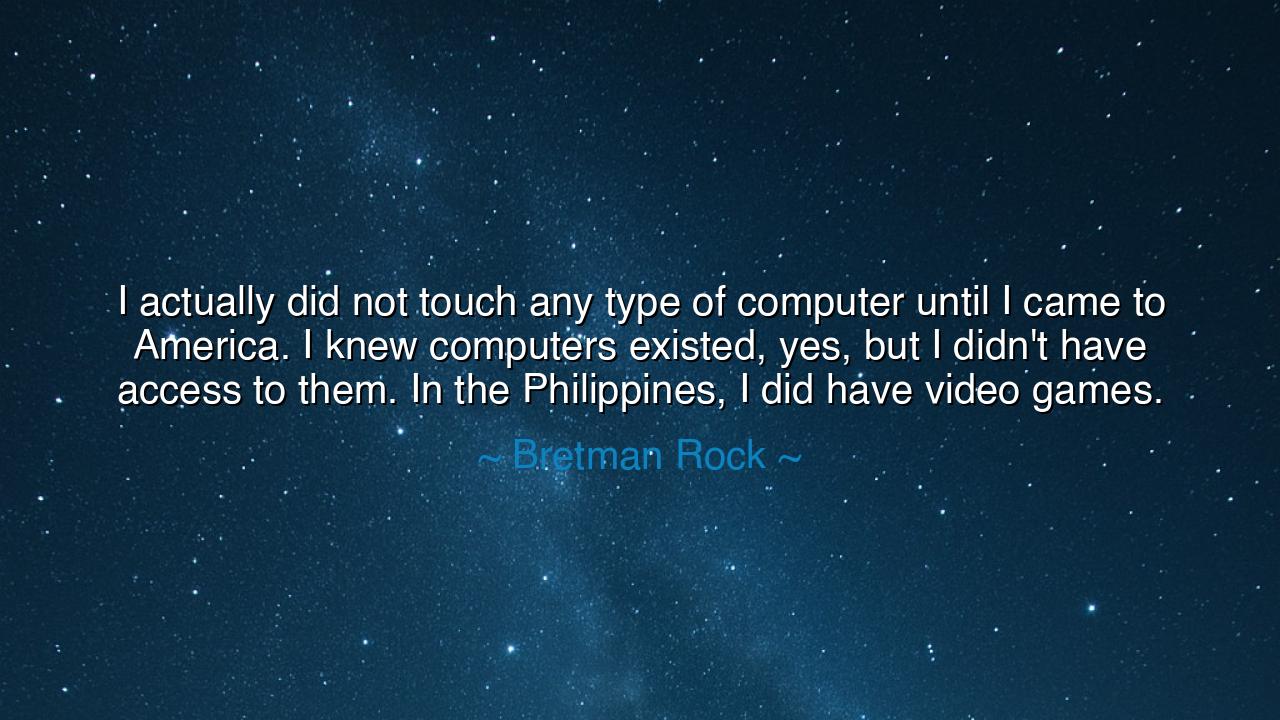
I actually did not touch any type of computer until I came to
I actually did not touch any type of computer until I came to America. I knew computers existed, yes, but I didn't have access to them. In the Philippines, I did have video games.






The words of Bretman Rock — “I actually did not touch any type of computer until I came to America. I knew computers existed, yes, but I didn't have access to them. In the Philippines, I did have video games.” — are more than a recollection of youth; they are a meditation on opportunity, change, and the unseen barriers between worlds. Beneath their simplicity lies the quiet story of a generation shaped by both scarcity and innovation — of a child born into a world where dreams outpaced access, yet whose imagination refused to be limited by circumstance. These words speak not only to personal memory but to the vast gulf that divides privilege from perseverance — and to the power of resilience that bridges it.
In the ancient tradition of storytelling, such reflections remind us that progress often begins in the humblest of beginnings. The philosophers of old would say that wisdom is born not in abundance, but in limitation. For it is deprivation that awakens the soul to its own resourcefulness. In Bretman’s story, we glimpse this eternal pattern: a young spirit from the islands, aware of a larger world yet separated from it by distance and circumstance, still finding joy in the simple tools of creativity — the games, the imagination, the play that births ingenuity. His confession is not one of lack, but of awakening — for when he finally touched the machine that would connect him to millions, he already carried within him the curiosity and vision that no computer could teach.
The origin of these words lies in Bretman’s journey from the Philippines to the United States — from a childhood shaped by modesty to a life defined by global influence. Born in a nation rich in heart yet limited in resources, he grew up amid contrasts: a world where digital technology was distant, yet storytelling, humor, and connection were alive in every street and home. When he came to America, he did not simply learn to use a computer; he discovered a new instrument for self-expression, a new way to amplify the voice he had long nurtured in silence. In that moment, technology became not just a tool, but a bridge between cultures, between identity and destiny.
This theme of transformation echoes throughout history. When Leonardo da Vinci first touched the gears and levers of invention, he too saw not mere mechanisms, but extensions of the human spirit. When the printing press was brought to Europe, it placed in the hands of the common man the power once reserved for kings and priests. Likewise, for Bretman Rock, the computer was not only an object of function — it was the gateway to creation, communication, and community. His story mirrors the timeless truth that access to knowledge changes not only lives, but legacies.
Yet his reflection also carries a subtle wisdom about gratitude and perspective. In his youth, Bretman did not have computers, but he had imagination, the most powerful technology of all. The ancient philosophers would have called this genius, the divine spark that allows humans to create worlds from nothing. The video games he mentions — the small joys of play — were seeds of curiosity and artistry. For it is not the tool that defines greatness, but the spirit that wields it. A mind alive with wonder needs only the smallest spark to illuminate the world.
In speaking these words, Bretman also gives voice to countless others who share similar beginnings — those who have known limitation, yet refuse to let it dictate their worth. He reminds us that access to technology, to education, to opportunity, remains unequal across the world, and that this inequality silences too many voices that might have sung. His story, then, is not just personal triumph, but moral reflection: a reminder to those with means that privilege is not possession, but responsibility. For those who have access must open doors for those who do not.
So, my children, take this lesson to heart: do not mistake lack for failure, nor privilege for destiny. The tools you hold — the screens, the machines, the networks — are nothing without vision, empathy, and discipline. Cherish them, but do not worship them. Remember that greatness begins not with technology, but with purpose. Seek to use your tools, as Bretman did, to uplift, to create, to connect — to make your voice a light for others who still dwell in the shadows of limitation.
And thus, his simple memory becomes an enduring teaching: that even in a world of digital power, the true source of creation remains human. For it is not the computer that gives meaning to the person, but the person who gives meaning to the computer. Bretman’s story, like those of the dreamers before him, reminds us that innovation begins not in access, but in imagination — and that no matter where one is born, the spirit that dares to create will always find a way to touch the infinite.






AAdministratorAdministrator
Welcome, honored guests. Please leave a comment, we will respond soon